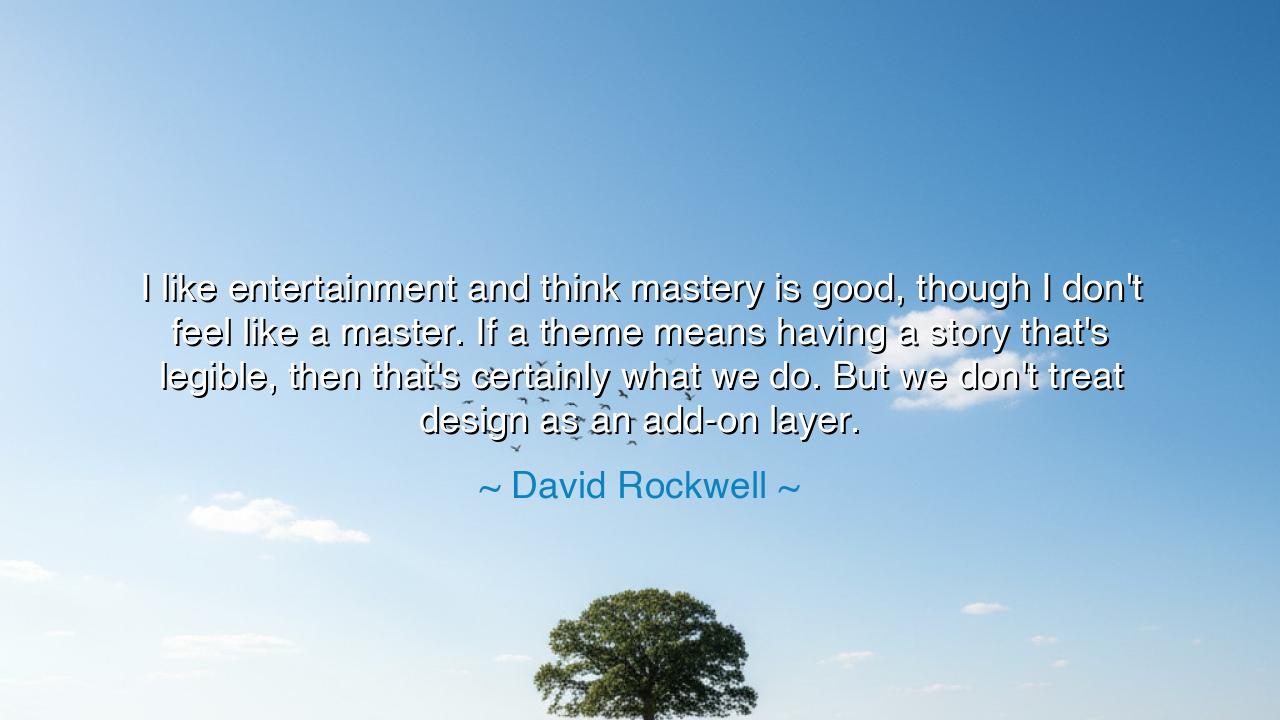
I like entertainment and think mastery is good, though I don't
I like entertainment and think mastery is good, though I don't feel like a master. If a theme means having a story that's legible, then that's certainly what we do. But we don't treat design as an add-on layer.






In the words of David Rockwell, master of spaces that tell stories and awaken wonder, we find a philosophy both humble and profound: “I like entertainment and think mastery is good, though I don’t feel like a master. If a theme means having a story that’s legible, then that’s certainly what we do. But we don’t treat design as an add-on layer.” Within this statement lives a truth that transcends architecture and design, reaching into the heart of all creation — that true mastery is not the pursuit of perfection, but the devotion to meaning, and that design, like life itself, must not be decoration but essence. Rockwell speaks as an artist of experience, one who builds not walls but emotions, not structures but stories.
In the days of the ancients, when builders raised temples to gods and poets sang the lineage of heroes, form and story were one. The Parthenon did not merely stand upon the Acropolis — it told of Athena’s wisdom, of the spirit of Athens itself. The Roman amphitheater was not only stone and arch, but the echo of the people’s voice, the embodiment of their hunger for drama, their communion in spectacle. The ancients knew what Rockwell reminds us of now — that design must breathe, that the builder and the storyteller are but two faces of the same muse. When the two are divided, the structure becomes hollow; but when they are joined, space itself becomes alive.
Rockwell’s humility in saying he does not “feel like a master” is the mark of true mastery. For the one who claims mastery has already ceased to grow, while the one who remains a student of wonder continues to create worlds anew. In the theatre of design — and in the theatre of life — mastery is not domination, but service: service to the story, to the people who will dwell within it, to the unseen rhythm that connects idea to experience. Thus, when Rockwell speaks of “entertainment,” he does not mean distraction or spectacle, but the art of engagement — that sacred act of drawing human hearts into shared emotion. He designs spaces that tell stories because he understands that every human being, whether seated in a theatre or walking through a city, seeks one thing above all: to feel connected, to be part of a living narrative.
Consider, as example, the ancient builders of Hagia Sophia in Constantinople. When they laid the first stones, they were not designing a mere church; they were composing a symphony of light and space. Every dome, every shaft of sunlight, every mosaic was part of a single story — the meeting of heaven and earth. The design was not an “add-on layer,” not a surface embellishment upon theology, but the embodiment of the divine idea itself. So too does Rockwell urge us to see: that when design becomes merely a layer, an afterthought, it dies. But when it is born from the soul of the story, when it is the vessel of the theme, it becomes something eternal — it becomes experience incarnate.
To treat design as an “add-on” is to forget that form and function, story and structure, are one and the same. The same truth holds in every craft and every calling. The teacher who decorates a lesson without passion teaches nothing; the musician who performs without belief plays noise, not music. The craftsman, the leader, the artist — all must learn Rockwell’s way: to create from within, not around. When design springs from purpose, when every line, texture, and motion arises from meaning, it captures the soul. This is the alchemy of true creation — not the layering of beauty upon utility, but their unbreakable union.
Rockwell’s quote also whispers of humility before the act of creation. To “not feel like a master” is to remain open to surprise, to dwell in the eternal tension between discipline and discovery. For in every act of making — whether a building, a poem, or a life — the moment one believes they have mastered all, the spirit of innovation fades. It is curiosity, not certainty, that keeps the creative heart aflame. The greatest masters of history — from Leonardo da Vinci to Frank Lloyd Wright — shared this humility. They built as seekers, not conquerors. They knew that art, at its highest, is not domination over form, but conversation with possibility.
Let this be the lesson for those who wish to build — not only with stone and steel, but with thought, love, and purpose. Do not design life as an add-on layer. Let every action, every word, every choice spring from your inner story. If you build a home, let it reflect your soul. If you create art, let it serve the human heart. If you lead, let your leadership arise from compassion, not control. Seek not to appear a master, but to live as a learner whose work is guided by story, by sincerity, and by joy.
And so, my children, remember the wisdom of David Rockwell: that mastery without meaning is hollow, and design without story is dead. To live beautifully is to weave your life like his architecture — where entertainment becomes wonder, mastery becomes humility, and every act, great or small, becomes part of a greater story that is legible to the soul. For the true artist, the true human, never adds meaning after the fact — he builds meaning into the very bones of the world.






AAdministratorAdministrator
Welcome, honored guests. Please leave a comment, we will respond soon